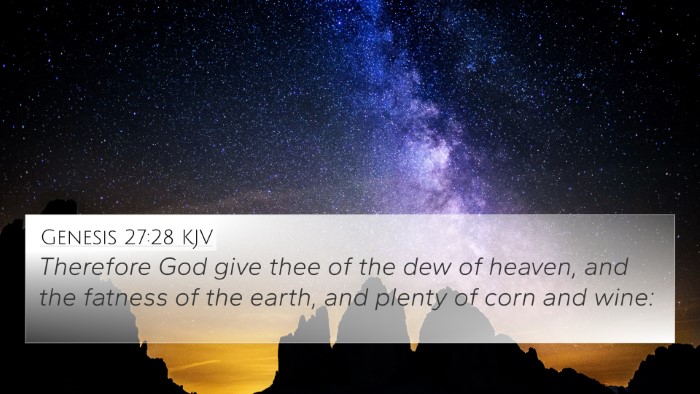Understanding Genesis 48:9
Genesis 48:9 states: "And Joseph said unto his father, They are my sons, whom God hath given me in this place. And he said, Bring them, I pray thee, unto me, and I will bless them." In this verse, we see the emotional and spiritual significance of Jacob blessing the next generation, specifically Joseph's sons, Ephraim and Manasseh. This moment is pivotal, showcasing family ties, divine providence, and the continuity of God's covenant.
Commentary Insights
Matthew Henry's Commentary
Matthew Henry notes that Joseph's introduction of his sons emphasizes God's gift to him. Henry emphasizes the importance of acknowledging God's blessings in our lives. He also points out Jacob's eager response to bless these children, signifying that blessings from a patriarch carry great weight and importance in the divine plan.
Albert Barnes' Commentary
Albert Barnes highlights the act of Jacob requesting to see Joseph's sons for the blessing as a sign of love and duty towards future generations. He explains the significance of blessings in biblical tradition, suggesting that they are anchors in a family’s lineage that involve not only material or physical well-being but also spiritual legacy and divine favor.
Adam Clarke's Commentary
Adam Clarke elaborates on the phrase "God hath given me," explaining that it recognizes God's sovereignty in bestowing children as blessings. Clarke remarks that Joseph's faith and love for his children reflect a deep admiration for God’s provision, and this acknowledgment fosters a lasting remembrance of God’s grace in their lineage.
Bible Verse Cross-References
- Genesis 17:19: God promises Abraham that Sarah will bear a son, establishing divine lineage.
- Exodus 1:1-5: The descendants of Jacob, reiterating the significance of family.
- Numbers 6:23-27: The priestly blessing that encapsulates Jacob’s desire for God’s favour on the sons.
- Deuteronomy 33:17: The blessing of Joseph among the tribes, hinting at the future roles of his sons.
- Matthew 19:14: Jesus acknowledges little children, reminding believers of the kingdom of heaven.
- Hebrews 11:21: Jacob blessing Joseph’s sons is noted as an act of faith.
- Ephesians 1:3: A call to praise for blessings bestowed upon believers in Christ.
Thematic Bible Verse Connections
Genesis 48:9 opens up a rich dialogue on themes such as blessings, family heritage, and divine authority over familial relations. The act of blessing one's children signifies the transference of spiritual and moral encouragement, similar to the patriarch Abraham's blessings over Isaac and Jacob, establishing a pattern seen throughout Scripture.
Cross-Referencing Biblical Texts
Utilizing cross-references can enhance the understanding of biblical narratives and themes. In studying Genesis 48:9, one may explore connections between blessing practices in various cultures, the significance of lineage in the Old Testament, and how these blessings extend into the teachings of the New Testament. The connection between Old and New Testament themes and their implications on faith and community are profound.
Tools for Bible Cross-Referencing
For those looking to deepen their understanding of connecting scripture, tools such as a Bible concordance or a Bible cross-reference guide are invaluable resources. They allow readers to uncover how themes and teachings connect across biblical texts, enriching personal and group study.
How to Use Bible Cross-References
Engaging with cross-referencing Bible study methods can reveal the intricate web of connections between verses. Identifying these associations encourages a comprehensive interpretation of individual scriptures and promotes a deeper understanding of Biblical themes.
User Intent Queries
If you are wondering what verses are related to Genesis 48:9 or how to find cross-references for this specific verse, utilizing Bible reference resources or online platforms that facilitate scriptural cross-referencing could be very beneficial. Moreover, understanding the similarities between Genesis 48:9 and other scripture will provide further context and meaning.




















